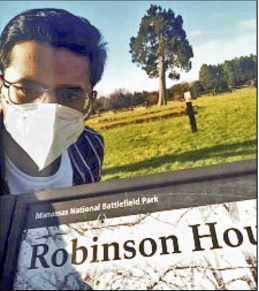by John Carter
This year’s Bull Run Civil War Round Table $2,000 Scholarship is awarded to
 |
Aaryan’s high school AP History teacher best describes a young man who is mature, and forward-thinking, beyond his years. “Aaryan is the most well-read, prepared student I have worked with in my 18 years of teaching. He is knowledgeable on every subject we discussed in both AP History and AP Human Geography. Excelling in both content and discussions, he challenged his peers to think more clearly and creatively. Aaryan is the student I see who can change the future - or is at least sensible enough to recognize the need for future change.”
This can be seen in his work with local and state organizations, which focused on issues relating to gun laws, human rights, mental health, and sexual assault laws. These are not just activities for Aaryan but are his medium for facilitating change. He is not motivated by the volume of his activities, nor by accolades he receives for them - he is motivated by creating change.
The awards, however, are plentiful: including the Fairfax County Public Schools Peace Award and the Fairfax County Public Schools Pride Courage Award. He was also awarded the Frederick A. Douglass and Susan B. Anthony Award for his commitment to social action.
Aaryan received the Harvard University Alumni Association Book Award for outstanding juniors.
A prospective Political Science major, he plans to apply his love of history to advance social justice, and to gain historical knowledge of court precedents that impact the judicial system. This fusion can be seen in his scholarship essay, The First Battle of Bull Run: Foreshadowing the True Impact of the American Civil War. While covering the main points of the battle, Aaryan began his essay with the initial political responses to southern secession by Presidents James Buchanan and Abraham Lincoln. The timidity of the Buchanan administration to respond to secession and the slowness of the Lincoln administration in ramping up a major response led to a demand for a prompt invasion of Richmond, which set the stage for a Union defeat and a prolonged war. At the end of his essay, he described the interactions of civilian life with the battlefield, and the lack of immediate impact that the battle had on the institution of slavery. Aaryan saw the battle as sparking some movement in the North’s prioritization on the issue of enslavement. His bibliography included twenty works. It is interesting to note that Aaryan’s self-picture, submitted with his scholarship application, was taken in front of the remnants of the Manassas battlefield house of Jim Robinson, a free-Black man.
Aaryan is an effective writer and speaker, and when you meet him in person, his maturity quickly makes you forget that you are talking to a high school student and not to a college gradu- ate. At the present time, Aaryan is considering several college acceptances as he finalizes his plans for enrollment this fall. He has been accepted at Harvard University, Yale University and the University of Virginia.
This is the tenth year that the Bull Run Civil War Round Table has given a scholarship. The first winner was in 2012, to Taylor McConnell from West Springfield High School. Other winners since 2012 include: Caroline Howard (Osbourn Park High School); Brook Roberts (James Robinson High School); Aaron Pirant (Herndon High School); Alexander Hughes (Osbourn High School); Joseph LaVigne (Elizabeth Seton High School); Jack Tatum (Oakton High School); Jacob Faber (Westfield High School); and last year’s winner, Isabelle Anderson (Thomas Edison High School).
Applicants submitted official high school transcripts that showed their courses, the level of those courses, their grades earned on each course, and a cumulative grade point average. They also submitted a description of their extra- curricular activities, a historical essay, a self- photo taken at a local historical sign, and an adult recommendation. The top candidates were interviewed by the Scholarship Committee, which recommended the winner to the Executive Board. Members of the Scholarship Committee include the chairman, Charlie Balch and members Brian McEnany, Mark Knowles, Thom- as Doran, and John Carter.